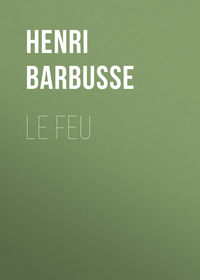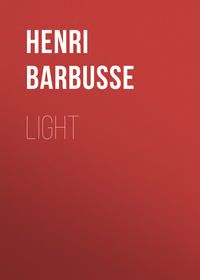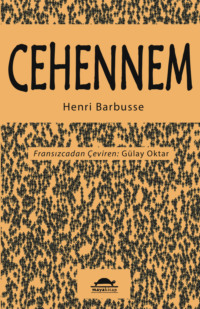 полная версия
полная версияUnder Fire: The Story of a Squad
How could we not envy him? He would be going away for one, two, or three months; and all that time, instead of our wretched privations, he would be transformed into a man of means!
"At the beginning," says Farfadet, "it sounded comic when I heard them wish for a 'good wound.' But all the same, and whatever can be said about it, I understand now that it's the only thing a poor soldier can hope for if he isn't daft."
We were drawing near to the village and passing round the wood. At its corner, the sudden shape of a woman arose against the sportive sunbeams that outlined her with light. Alertly erect she stood, before the faintly violet background of the wood's marge and the crosshatched trees. She was slender, her head all afire with fair hair, and in her pale face we could see the night-dark caverns of great eyes. The resplendent being gazed fixedly upon us, trembling, then plunged abruptly into the undergrowth and disappeared like a torch.
The apparition and its flight so impressed Volpatte that he lost the thread of his discourse.
"She's something like, that woman there!"
"No," said Fouillade, who had misunderstood, "she's called Eudoxie. I knew her because I've seen her before. A refugee. I don't know where she comes from, but she's at Gamblin, in a family there."
"She's thin and beautiful," Volpatte certified; "one would like to make her a little present—she's good enough to eat—tender as a chicken. And look at the eyes she's got!"
"She's queer," says Fouillade. "You don't know when you've got her. You see her here, there, with her fair hair on top, then—off! Nobody about. And you know, she doesn't know what danger is; marching about, sometimes, almost in the front line, and she's been seen knocking about in No Man's Land. She's queer."
"Look! There she is again. The spook! She's keeping an eye on us. What's she after?"
The shadow-figure, traced in lines of light, this time adorned the other end of the spinney's edge.
"To hell with women," Volpatte declared, whom the idea of his deliverance has completely recaptured.
"There's one in the squad, anyway, that wants her pretty badly. See—when you speak of the wolf—"
"You see its tail—"
"Not yet, but almost—look!" From some bushes on our right we saw the red snout of Lamuse appear peeping, like a wild boar's.
He was on the woman's trail. He had seen the alluring vision, dropped to the crouch of a setting dog, and made his spring. But in that spring he fell upon us.
Recognizing Volpatte and Fouillade, big Lamuse gave shouts of delight. At once he had no other thought than to get possession of the bags, rifles, and haversacks—"Give me all of it—I'm resting—come on, give it up."
He must carry everything. Farfadet and I willingly gave up Volpatte's equipment; and Fouillade, now at the end of his strength, agreed to surrender his pouches and his rifle.
Lamuse became a moving heap. Under the huge burden he disappeared, bent double, and made progress only with shortened steps.
But we felt that he was still under the sway of a certain project, and his glances went sideways. He was seeking the woman after whom he had hurled himself. Every time he halted, the better to trim some detail of the load, or puffingly to mop the greasy flow of perspiration, he furtively surveyed all the corners of the horizon and scrutinized the edges of the wood. He did not see her again.
I did see her again, and got a distinct impression this time that it was one of us she was after. She half arose on our left from the green shadows of the undergrowth. Steadying herself with one hand on a branch, she leaned forward and revealed the night-dark eyes and pale face, which showed—so brightly lighted was one whole side of it—like a crescent moon.
I saw that she was smiling. And following the course of the look that smiled, I saw Farfadet a little way behind us, and he was smiling too. Then she slipped away into the dark foliage, carrying the twin smile with her.
Thus was the understanding revealed to me between this lissom and dainty gypsy, who was like no one at all, and Farfadet, conspicuous among us all—slender, pliant and sensitive as lilac. Evidently—!
Lamuse saw nothing, blinded and borne down as he was by the load he had taken from Farfadet and me, occupied in the poise of them, and in finding where his laden and leaden feet might tread.
But he looks unhappy; he groans. A weighty and mournful obsession is stifling him. In his harsh breathing it seems to me that I can hear his heart beating and muttering. Looking at Volpatte, hooded in bandages, and then at the strong man, muscular and full-blooded, with that profound and eternal yearning whose sharpness he alone can gauge, I say to myself that the worst wounded man is not he whom we think.
We go down at last to the village. "Let's have a drink," says Fouillade. "I'm going to be sent back," says Volpatte. Lamuse puffs and groans.
Our comrades shout and come running, and we gather in the little square where the church stands with its twin towers—so thoroughly mutilated by a shell that one can no longer look it in the face.
V
Sanctuary
THE dim road which rises through the middle of the night-bound wood is so strangely full of obstructing shadows that the deep darkness of the forest itself might by some magic have overflowed upon it. It is the regiment on the march, in quest of a new home.
The weighty ranks of the shadows, burdened both high and broad, hustle each other blindly. Each wave, pushed by the following, stumbles upon the one in front, while alongside and detached are the evolutions of those less bulky ghosts, the N.C.O.'s. A clamor of confusion, compound of exclamations, of scraps of chat, of words of command, of spasms of coughing and of song, goes up from the dense mob enclosed between the banks. To the vocal commotion is added the tramping of feet, the jingling of bayonets in their scabbards, of cans and drinking-cups, the rumbling and hammering of the sixty vehicles of the two convoys—fighting and regimental—that follow the two battalions. And such a thing is it that trudges and spreads itself over the climbing road that, in spite of the unbounded dome of night, one welters in the odor of a den of lions.
In the ranks one sees nothing. Sometimes, when one can lift his nose up, by grace of an eddy in the tide, one cannot help seeing the whiteness of a mess-tin, the blue steel of a helmet, the black steel of a rifle. Anon, by the dazzling jet of sparks that flies from a pocket flint-and-steel, or the red flame that expands upon the lilliputian stem of a match, one can see beyond the vivid near relief of hands and faces to the silhouetted and disordered groups of helmeted shoulders, swaying like surges that would storm the sable stronghold of the night. Then, all goes out, and while each tramping soldier's legs swing to and fro, his eye is fixed inflexibly upon the conjectural situation of the back that dwells in front of him.
After several halts, when we have allowed ourselves to collapse on our haversacks at the foot of the stacked rifles—stacks that form on the call of the whistle with feverish haste and exasperating delay, through our blindness in that atmosphere of ink-dawn reveals itself, extends, and acquires the domain of Space. The walls of the Shadow crumble in vague ruin. Once more we pass under the grand panorama of the day's unfolding upon the ever-wandering horde that we are.
We emerge at last from this night of marching, across concentric circles as it seems, of darkness less dark, then of half-shadow, then of gloomy light. Legs have a wooden stiffness, backs are benumbed, shoulders bruised. Faces are still so gray or so black, one would say they had but half rid themselves of the night. Now, indeed, one never throws it off altogether.
It is into new quarters that the great company is going—this time to rest. What will the place be like that we have to live in for eight days? It is called, they say—but nobody is certain of anything—Gauchin-l'Abbe. We have heard wonders about it—"It appears to be just it."
In the ranks of the companies whose forms and features one begins to make out in the birth of morning, and to distinguish the lowered heads and yawning mouths, some voices are heard in still higher praise. "There never were such quarters. The Brigade's there, and the court-martial. You can get anything in the shops."—"If the Brigade's there, we're all right."—
"Think we can find a table for the squad?"—"Everything you want, I tell you."
A pessimist prophet shakes his head: "What these quarters'll be like where we've never been, I don't know," he says. "What I do know is that it'll be like the others."
But we don't believe him, and emerging from the fevered turmoil of the night, it seems to all that it is a sort of Promised Land we are approaching by degrees as the light brings us out of the east and the icy air towards the unknown village.
At the foot of a bill in the half-light, we reach some houses, still slumbering and wrapped in heavy grayness.
"There it is!"
Poof! We've done twenty-eight kilometers in the night. But what of that? There is no halt. We go past the houses, and they sink back again into their vague vapors and their mysterious shroud.
"Seems we've got to march a long time yet. It's always there, there, there!"
We march like machines, our limbs invaded by a sort of petrified torpor; our joints cry aloud, and force us to make echo.
Day comes slowly, for a blanket of mist covers the earth. It is so cold that the men dare not sit down during the halts, though overborne by weariness, and they pace to and fro in the damp obscurity like ghosts. The besom of a biting wintry wind whips our skin, sweeps away and scatters our words and our sighs.
At last the sun pierces the reek that spreads over us and soaks what it touches, and something like a fairy glade opens out in the midst of this gloom terrestrial. The regiment stretches itself and wakes up in truth, with slow-lifted faces to the gilded silver of the earliest rays. Quickly, then, the sun grows fiery, and now it is too hot. In the ranks we pant and sweat, and our grumbling is louder even than just now, when our teeth were chattering and the fog wet-sponged our hands and faces.
It is a chalk country through which we are passing on this torrid forenoon—"They mend this road with lime, the dirty devils!" The road has become blinding—a long-drawn cloud of dessicated chalk and dust that rises high above our columns and powders us as we go. Faces turn red, and shine as though varnished; some of the full-blooded ones might be plastered with vaseline. Cheeks and foreheads are coated with a rusty paste which agglutinates and cracks. Feet lose their dubious likeness to feet and might have paddled in a mason's mortar-trough. Haversacks and rifles are powdered in white, and our legion leaves to left and right a long milky track on the bordering grass. And to crown all—"To the right! A convoy!"
We bear to the right, hurriedly, and not without bumpings. The convoy of lorries, a long chain of foursquare and huge projectiles, rolling up with diabolical din, hurls itself along the road. Curse it! One after another, they gather up the thick carpet of white powder that upholsters the ground and send it broadcast over our shoulders! Now we are garbed in a stuff of light gray and our faces are pallid masks, thickest on the eyebrows and mustaches, on beards, and the cracks of wrinkles. Though still ourselves, we look like strange old men.
"When we're old buffers, we shall be as ugly as this," says Tirette.
"Tu craches blanc," declares Biquet.4
When a halt puts us out of action, you might take us for rows of plaster statues, with some dirty indications of humanity showing through.
We move again, silent and chagrined. Every step becomes hard to complete. Our faces assume congealed and fixed grimaces under the wan leprosy of dust. The unending effort contracts us and quite fills us with dismal weariness and disgust.
We espy at last the long-sought oasis. Beyond a hill, on a still higher one, some slated roofs peep from clusters of foliage as brightly green as a salad. The village is there, and our looks embrace it, but we are not there yet. For a long time it seems to recede as fast as the regiment crawls towards it.
At long last, on the stroke of noon, we reach the quarters that had begun to appear a pretense and a legend. In regular step and with rifles on shoulders, the regiment floods the street of Gauchin-l'Abbe right to its edges. Most of the villages of the Pas du Calais are composed of a single street, but such a street! It is often several kilometers long. In this one, the street divides in front of the mairie and forms two others, so that the hamlet becomes a big Y, brokenly bordered by low-built dwellings.
The cyclists, the officers, the orderlies, break away from the long moving mass. Then, as they come up, a few of the men at a time are swallowed up by the barns, the still available houses being reserved for officers and departments. Our half-company is led at first to the end of the village, and then—by some misunderstanding among the quartermasters—back to the other end, the one by which we entered. This oscillation takes up time, and the squad, dragged thus from north to south and from south to north, heavily fatigued and irritated by wasted walking, evinces feverish impatience. For it is supremely important to be installed and set free as early as possible if we are to carry out the plan we have cherished so long—to find a native with some little place to let, and a table where the squad can have its meals. We have talked a good deal about this idea and its delightful advantages. We have taken counsel, subscribed to a common fund, and decided that this time we will take the header into the additional outlay.
But will it be possible? Very many places are already snapped up. We are not the only ones to bring our dream of comfort here, and it will be a race for that table. Three companies are coming in after ours, but four were here before us, and there are the officers, the cooks of the hospital staff for the Section, and the clerks, the drivers, the orderlies and others, official cooks of the sergeants' mess, and I don't know how many more. All these men are more influential than the soldiers of the line, they have more mobility and more money, and can bring off their schemes beforehand. Already, while we march four abreast towards the barn assigned to the squad, we see some of these jokers across the conquered thresholds, domestically busy.
Tirette imitates the sounds of lowing and bleating—"There's our cattle-shed." A fairly big barn. The chopped straw smells of night-soil, and our feet stir up clouds of dust. But it is almost enclosed. We choose our places and cast off our equipment.
Those who dreamed yet once again of a special sort of Paradise sing low—yet once again. "Look now, it seems as ugly as the other places."—"It's something like the same."—"Naturally."
But there is no time to waste in talking. The thing is to get clear and be after the others with all strength and speed. We hurry out. In spite of broken backs and aching feet, we set ourselves savagely to this last effort on which the comfort of a week depends.
The squad divides into two patrols and sets off at the double, one to left and one to right along the street, which is already obstructed by busy questing poilus; and all the groups see and watch each other—and hurry. In places there are collisions, jostlings, and abuse.
"Let's begin down there at once, or our goose'll be cooked!" I have an impression of a kind of fierce battle between all the soldiers, in the streets of the village they have just occupied. "For us," says Marthereau, "war is always struggling and fighting—always, always."
We knock at door after door, we show ourselves timidly, we offer ourselves like undesirable goods. A voice arises among us, "You haven't a bit of a corner, madame, for some soldiers? We would pay."
"No—you see, I've got officers—under-officers, that is—you see, it's the mess for the band, and the secretaries, and the gentlemen of the ambulance—"
Vexation after vexation. We close again, one after the other, all the doors we had half-opened, and look at each other, on the wrong side of the threshold, with dwindling hope in our eyes.
"Bon Dieu! You'll see that we shan't find anything," growls Barque. "Damn those chaps that got on the midden before us!"
The human flood reaches high-water mark everywhere. The three streets are all growing dark as each overflows into another. Some natives cross our path, old men or ill-shapen, contorted in their walk, stunted in the face; and even young people, too, over whom hovers the mystery of secret disorders or political connections. As for the petticoats, there are old women and many young ones—fat, with well-padded cheeks, and equal to geese in their whiteness.
Suddenly, in an alley between two houses, I have a fleeting vision of a woman who crossed the shadowy gap—Eudoxie! Eudoxie, the fairy woman whom Lamuse hunted like a satyr, away back in the country, that morning we brought back Volpatte wounded, and Fouillade, the woman I saw leaning from the spinney's edge and bound to Farfadet in a mutual smile. It is she whom I just glimpsed like a gleam of sunshine in that alley. But the gleam was eclipsed by the tail of a wall, and the place thereof relapsed upon gloom. She here, already! Then she has followed our long and painful trek! She is attracted—?
And she looks like one allured, too. Brief glimpse though it was of her face and its crown of fair hair, plainly I saw that she was serious, thoughtful, absentminded.
Lamuse, following close on my heels, saw nothing, and I do not tell him. He will discover quite soon enough the bright presence of that lovely flame where he would fain cast himself bodily, though it evades him like a Will-o'-th'-wisp. For the moment, besides, we are on business bent. The coveted corner must be won. We resume the hunt with the energy of despair. Barque leads us on; he has taken the matter to heart. He is trembling—you can see it in his dusty scalp. He guides us, nose to the wind. He suggests that we make an attempt on that yellow door over there. Forward!
Near the yellow door, we encounter a shape down-bent. Blaire, his foot on a milestone, is reducing the bulk of his boot with his knife, and plaster-like debris is falling fast. He might be engaged in sculpture.
"You never had your feet so white before," jeers Barque. "Rotting apart," says Blaire, "you don't know where it is, that special van?" He goes on to explain: "I've got to look up the dentist-van, so they can grapple with my ivories, and strip off the old grinders that's left. Oui, seems it's stationed here, the chop-caravan."
He folds up his knife, pockets it, and goes off alongside the wall, possessed by the thought of his jaw-bones' new lease of life.
Once more we put up our beggars' petition: "Good-day, madame; you haven't got a little corner where we could feed? We would pay, of course, we would pay—"
Through the glass of the low window we see lifted the face of an old man—like a fish in a bowl, it looks—a face curiously flat, and lined with parallel wrinkles, like a page of old manuscript.
"You've the little shed there."
"There's no room in the shed, and when the washing's done there—"
Barque seizes the chance. "It'll do very likely. May we see it?"
"We do the washing there," mutters the woman, continuing to wield her broom.
"You know," says Barque, with a smile and an engaging air, "we're not like those disagreeable people who get drunk and make themselves a nuisance. May we have a look?"
The woman has let her broom rest. She is thin and inconspicuous. Her jacket hangs from her shoulders as from a valise. Her face is like cardboard, stiff and without expression. She looks at us and hesitates, then grudgingly leads the way into a very dark little place, made of beaten earth and piled with dirty linen.
"It's splendid," cries Lamuse, in all honesty.
"Isn't she a darling, the little kiddie!" says Barque, as he pats the round cheek, like painted india-rubber, of a little girl who is staring at us with her dirty little nose uplifted in the gloom. "Is she yours, madame?"
"And that one, too?" risks Marthereau, as he espies an over-ripe infant on whose bladder-like cheeks are shining deposits of jam, for the ensnaring of the dust in the air. He offers a half-hearted caress in the direction of the moist and bedaubed countenance. The woman does not deign an answer.
So there we are, trifling and grinning, like beggars whose plea still hangs fire.
Lamuse whispers to me, in a torment of fear and cupidity, "Let's hope she'll catch on, the filthy old slut. It's grand here, and, you know, everything else is pinched!"
"There's no table," the woman says at last.
"Don't worry about the table," Barque exclaims. "Tenez! there, put away in that corner, the old door; that would make us a table."
"You're not going to trail me about and upset all my work!" replies the cardboard woman suspiciously, and with obvious regret that she had not chased us away immediately.
"Don't worry, I tell you. Look, I'll show you. Hey, Lamuse, old cock, give me a hand."
Under the displeased glances of the virago we place the old door on a couple of barrels.
"With a bit of a rub-down," says I, "that will be perfect."
"Eh, oui, maman, a flick with a brush'll do us instead of tablecloth."
The woman hardly knows what to say; she watches us spitefully: "There's only two stools, and how many are there of you?"
"About a dozen."
"A dozen. Jesus Maria!"
"What does it matter? That'll be all right, seeing there's a plank here—and that's a bench ready-made, eh, Lamuse?"
"Course," says Lamuse.
"I want that plank," says the woman. "Some soldiers that were here before you have tried already to take it away."
"But us, we're not thieves," suggests Lamuse gently, so as not to irritate the creature that has our comfort at her disposal.
"I don't say you are, but soldiers, vous savez, they smash everything up. Oh, the misery of this war!"
"Well then, how much'll it be, to hire the table, and to heat up a thing or two on the stove?"
"It'll be twenty sous a day," announces the hostess with restraint, as though we were wringing that amount from her.
"It's dear," says Lamuse.
"It's what the others gave me that were here, and they were very kind, too, those gentlemen, and it was worth my while to cook for them. I know it's not difficult for soldiers. If you think it's too much, it's no job to find other customers for this room and this table and the stove, and who wouldn't be in twelves. They're coming along all the time, and they'd pay still more, if I wanted. A dozen!—"
Lamuse hastens to add, "I said 'It's dear,' but still, it'll do, eh, you others?" On this downright question we record our votes.
"We could do well with a drop to drink," says Lamuse. "Do you sell wine?"
"No," said the woman, but added, shaking with anger, "You see, the military authority forces them that's got wine to sell it at fifteen sous! Fifteen sous! The misery of this cursed war! One loses at it, at fifteen sous, monsieur. So I don't sell any wine. I've got plenty for ourselves. I don't say but sometimes, and just to oblige, I don't allow some to people that one knows, people that knows what things are, but of course, messieurs, not at fifteen sous."
Lamuse is one of those people "that knows what things are." He grabs at his water-bottle, which is hanging as usual on his hip. "Give me a liter of it. That'll be what?"
"That'll be twenty-two sous, same as it cost me. But you know it's just to oblige you, because you're soldiers."
Barque, losing patience, mutters an aside. The woman throws him a surly glance, and makes as if to hand Lamuse's bottle back to him. But Lamuse, launched upon the hope of drinking wine at last, so that his cheeks redden as if the draught already pervaded them with its grateful hue, hastens to intervene—
"Don't be afraid—it's between ourselves, la mere, we won't give you away."
She raves on, rigid and bitter, against the limited price on wine; and, overcome by his lusty thirst, Lamuse extends the humiliation and surrender of conscience so far as to say, "No help for it, madame! It's a military order, so it's no use trying to understand it."







